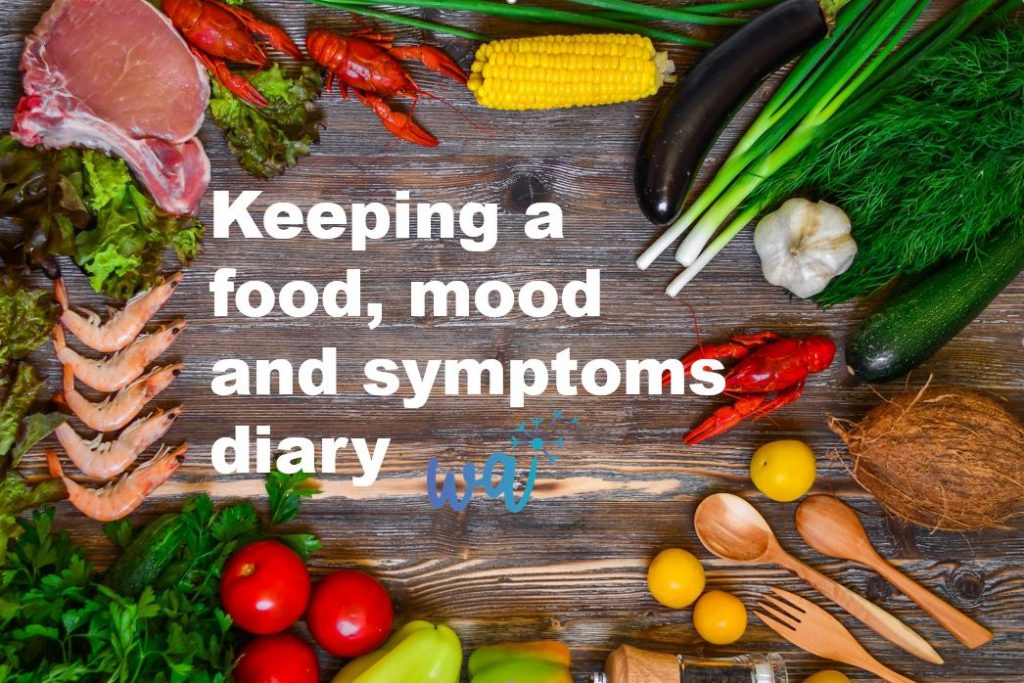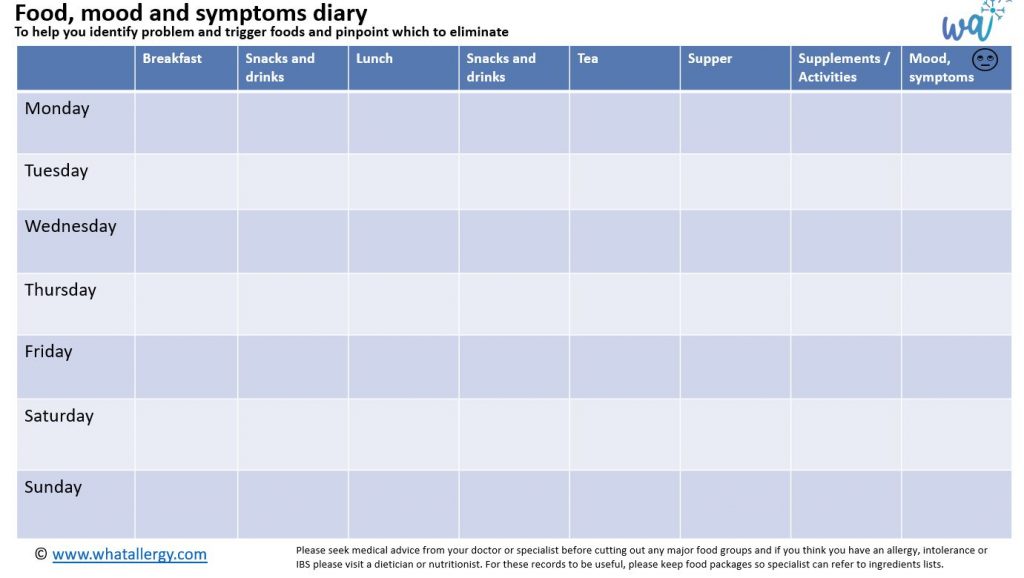You may be thinking that some foods could be affecting your skin and/or gut but it can be complicated and lead to delayed reactions, even a few days after eating. Consider how complex and varied our diets are and how many different ingredients you consume each day and it’s not an easy task to pinpoint any one food as the culprit.

What is a food, mood and symptoms diary?
Skin irritation, eczema flares, Irritable bowel, constipation, bloating and excess wind can all be signs something is wrong. It could be an allergy or food intolerance, but working out how to change your diet is not easy.
You need to really honest and record everything, from drinks and snacks to each food consumed for each meal you have, right down the packet foods with lists of ingredients. It isn’t easy to do and people often don’t record things properly which makes it impossible to find answers.
Why is it useful to keep a food diary?
If you’re currently trying to get a referral to an allergy specialist or think you may have mild allergies or food intolerances, keeping a food, mood and symptoms diary could be really useful.
It can be almost impossible sometimes to pinpoint which food or foods might be causing you problems, because throughout the day we consume so many different types of food.
Many people find that eating a diet avoiding FODMAPS foods can help, but until you’ve worked out what’s going on for you it could be like looking for a needle in a hay stack. If you want to find out more about FODMAPS you should seek professional advice because they are very complicated – basically they are collection of what seem to be random foods that can cause fermentation in the gut, bloating and discomfort for some people.
Download a free food, mood and symptoms diary
This is a diary that I created for myself, to help me record what I was eating because the document provided by the nutritionist at the time wasn’t really fit for the job so I ended up with so many extra notes and it got quiet hard to report back and document neatly.

I did a food diary many, many years ago with a dietitian who then helped me navigate an elimination diet. This is not something I would ever recommend without a specialist because you could be limiting your diet unnecessarily. You also might learn very little from the experiment if you don’t follow a sensible regime and reintroduce foods in the correct order. I’ll write more about that soon.
What I remember from keeping a food diary was just how hard it was to note down everything; every drink, snack, element of your meals throughout the day. It can be an eye opener to see, written down on paper, just how many cups of coffee you have, or chocolate bars you consume! And finding a good way to collect this data was never easy.
You may also find this article helpful, How to keep a food journal.
Keep packets of processed food
If you eat lots of processed food you’ll need to keep all the packets so that you and your dietitian can scrutinise the ingredients to see if you can work out whether different foods are the issue.
Seeing the pile or packets is quite an eye opener too! It’s actually meant that my diet is improving as I work through the days and see what I’m eating in such a visual way in front of me. Once we throw out the packaging for those crisps, snacks etc. they’re out of mind. I’ve found I’m trying to eat better so that my food diary makes better reading!
I’ve created my own document that I hope will help you guys too. You can download it here.
It has a one pager which you might be able to use for all your food and drink. I found that some days I was eating so many different ingredients in a meal that I needed loads of space, so you’ll find also a page for each day of the week.
How long should I record for?
I would suggest probably two to three weeks to get a good diverse log of data to analyse. Too little information and you might not find much out. Too much and you won’t be able to see what’s going on. I hope my little handout helps. It will be useful to take this kind of information when you visit your allergist, dermatologist, nutritionist/dietician or doctor as they might be able to find something out from this. It may also help show that you are serious about finding out the triggers for your symptoms. And it might help you reach the correct diagnosis.
What should I record?
Note down everything, even the number of glasses of water. One thing I discovered last time I did this exercise was that I was drinking far too much water with each meal. Too much water can cause problems just as not enough can cause dehydration. So I now have a small amount to drink with my meal, but I make sure I do hydrate with water, herbal tea and fruit between meals.
I also made some tiny changes such as cooking oats in porridge rather than lots of muesli with uncooked oats. My gut was much happier with the oats cooked.
Note down how you feel, moods, headaches, itchiness, bloating, constipation, sickness and any allergic reactions. Observe how you sleep, does exercise have any effect? Write it all down.
Obviously never ever experiment like this with foods you know you are allergic to, steer clear or your allergens.
I’d love to hear from anyone else who’s done this and discovered what they were reacting to. Have you done a food diary before? How did you find the exercise? What did you find out what your food triggers were?
NB. If you have continued constipation, diarrhoea or bowel symptoms you should always see your doctor as it could be a sign of a more serious condition that needs medical attention.












Was looking for some takes regarding this topic and I found your article quite informative. It has given me a fresh perspective on the topic tackled. Thanks!